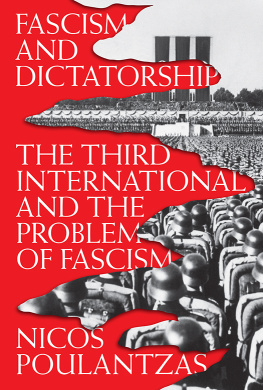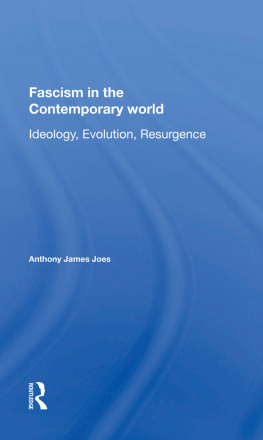Contents

Fascism and Dictatorship
Fascism and Dictatorship
The Third International and
the Problem of Fascism
Nicos Poulantzas
Foreword by Dylan Riley
Translated from the French by Judith White
Translation editors Jennifer and Timothy OHagan

This edition published by Verso 2018
New Left Books edition first published 1974
First published as Fascisme et dictature by Franois Maspero 1970
Franois Maspero 1970
New Left Books 1974
Verso 1979, 2018
Foreword Dylan Riley 2018
All rights reserved
The moral rights of the authors have been asserted
1 3 5 7 9 10 8 6 4 2
Verso
UK: 6 Meard Street, London W1F 0EG
US: 20 Jay Street, Suite 1010, Brooklyn, NY 11201
versobooks.com
Verso is the imprint of New Left Books
ISBN-13: 978-1-78663-581-5
ISBN-13: 978-1-78663-582-2 (UK EBK)
ISBN-13: 978-1-78663-583-9 (US EBK)
British Library Cataloguing in Publication Data
A catalogue record for this book is available from the British Library
Library of Congress Cataloging-in-Publication Data
A catalog record for this book is available from the Library of Congress
Printed and bound by CPI Group (UK) Ltd, Croydon CR0 4YY
FASCISM AND DICTATORSHIP IN CONTEXT
Why would a Greek Communist (Poulantzas had joined the KKE as a student in Paris) write a long and difficult book about inter-war fascism in the heady days of the late sixties?
Fascism and Dictatorship, in addition to its connection to the conjuncture of the late sixties, must also be understood in relationship to its authors intellectual biography. Following his legal training, Poulantzass initial project was to blend existentialism with the philosophy of law. It was only in the later sixties that he emerged as a theorist of the State, with the publication of Political Power and Social Classes. In this text, Poulantzas dealt with fascism in the context of some extremely interesting, but highly abstract, remarks on the concept of totalitarianism. However, its main thrust was to establish the Fundamental Characteristics of the Capitalist State, which Poulantzas treated in an openly functionalist way, arguing that all capitalist States had the dual task of preventing the political organization of the dominated classes, and of organizing the dominant class.under which capitalist societies might be ruled through dictatorship or democracy, to paraphrase Barrington Moore. Fascism and Dictatorship attempted to address part of this problem: to explain the conditions under which capitalist classes might abandon parliamentary procedures and embrace dictatorship.
FASCISM AND DICTATORSHIP: THE THIRD INTERNATIONAL AND THE PROBLEM OF FASCISM (THE ARGUMENT)
Poulantzass book has three foci. It seeks to establish the causes and consequences of fascism in Italy and Germany; it seeks to locate fascism as a type of capitalist State, and finally it seeks to analyse the relationship between the rise of fascism and Comintern policy in the twenties and thirties. These issues are linked, since, for Poulantzas, the Cominterns incorrect economistic understanding of fascism underlay a series of strategic errors, which were in turn part of the causal process by which fascism came to power. Accordingly, Fascism and Dictatorship continually shifts between two levels of analysis: it is both a political sociology of the rise of fascism, and a running critique of Marxist theories of it.
Fascism and Dictatorship unfolds in seven parts. The text opens with two introductory studies: The Period of Fascism, situating the phenomenon in relationship to the geopolitics of inter-war Europe, and Fascism and the Class Struggle, which identifies, within the international context, the specific pattern of class struggle that produced fascist regimes. Following these relatively brief sections are four longer analyses devoted to the connection between fascism and social classes: Fascism and the Dominant Classes, Fascism and the Working Class, Fascism and the Petty Bourgeoisie, and Fascism and the Countryside. The book ends with The Fascist State, which offers a typology of the exceptional capitalist State and locates fascist regimes within it.
What is the central argument? Poulantzas claims that fascist regimes arose in inter-war Europe from the political disintegration of the German and Italian dominant classes, combined with a failed revolutionary breakthrough by the working class. In short, the two principle classes of capitalism the major owners of means of production and industrial workers failed in their respective bids to establish hegemony over German and Italian society. This double failure set free small producers, traders and salaried employees (the petty bourgeoisie) to act as an autonomous social force in the fascist parties. (Small agrarian producers and the agricultural proletariat played a similar, but less important, role for Poulantzas.) Fascism then emerged as the political organization of the petty bourgeoisie, carrying it to power, and allowing it to act as the class in charge of the State. In this capacity it reestablished the hegemony of big monopoly capital before retreating from the scene as the fascist party itself became increasingly subordinated by both the State and capital. If this is the general claim, how is it developed in Poulantzass book?
The Period of Fascism
Poulantzas, in a modification of Horkheimers famous dictum, writes that he who does not wish to discuss imperialism should stay silent on the subject of fascism. This transition to the imperialist stage of capitalism forms the general context within which fascist regimes arise.
While this transformation from liberal to imperialist capitalism was general, fascist regimes emerged only in Italy and Germany, defined as the next two weakest links of the imperialist chain after Russia. Thus, the Italian bourgeoisie paid for its precocious hegemony by maintaining feudalism in the south. The southern agrari allowed the northern bourgeoisie to run the State as long as it did not pursue agrarian reform. In any case, the economic consequences of this different political configuration were the same as in Germany: a restricted home market together with a highly State-dependent industrial sector.
The two cases, to summarize Poulantzass argument, are similar in their position within the imperialist chain of States. Both were latecomers to the imperial game, and their leaderships pursued strategies of development that tended to exacerbate rather than ameliorate the disequilibrium between industrial production and domestic demand.
Poulantzas then turns to an analysis and critique of Comintern theories of fascism. Initially, the Third International attributed the rise of fascism in Italy to economic backwardness, and the Comintern confidently concluded that fascism would not come to Germany. These incompatible explanations (fascism growing out of both backwardness and rotten ripeness) expressed an underlying economism that tried to link fascism directly to a particular stage of capitalist development. (This point is much the same as Trotksys.)
Economism vitiated Communist Party strategy throughout the inter-war period. In the early twenties the economistic interpretation of imperialism led to the conclusion that revolution was on the agenda in the European imperialist countries. But this analysis lacked any specific understanding of the concrete conjuncture of the class struggle.but was used to make an opposite political argument. The Communist parties had shifted away from ultra-leftism to an equally debilitating ultra-rightism. Finally, after the Sixth Congress of 1928, which canonized the notorious idea of equivalence between social democracy and fascism, the Comintern declared the opening of a Third Period, in which revolution was again held to be on the agenda everywhere.













